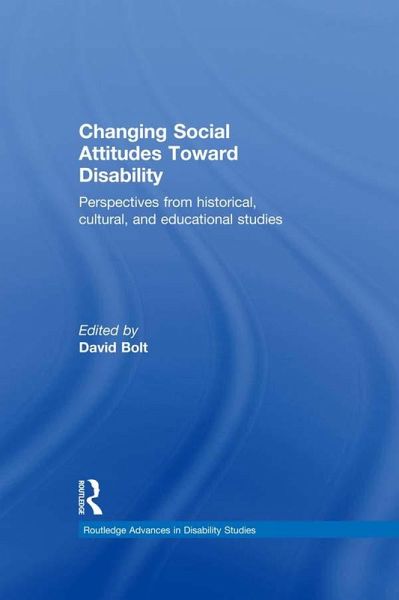
Changing Social Attitudes Toward Disability (eBook, PDF)
Perspectives from historical, cultural, and educational studies
Redaktion: Bolt, David
Versandkostenfrei!
Sofort per Download lieferbar
49,95 €
inkl. MwSt.
Weitere Ausgaben:

PAYBACK Punkte
25 °P sammeln!
Whilst legislation may have progressed internationally and nationally for disabled people, barriers continue to exist, of which one of the most pervasive and ingrained is attitudinal. Social attitudes are often rooted in a lack of knowledge and are perpetuated through erroneous stereotypes, and ultimately these legal and policy changes are ineffectual without a corresponding attitudinal change.This unique book provides a much needed, multifaceted exploration of changing social attitudes toward disability. Adopting a tripartite approach to examining disability, the book looks at historical, cul...
Whilst legislation may have progressed internationally and nationally for disabled people, barriers continue to exist, of which one of the most pervasive and ingrained is attitudinal. Social attitudes are often rooted in a lack of knowledge and are perpetuated through erroneous stereotypes, and ultimately these legal and policy changes are ineffectual without a corresponding attitudinal change.
This unique book provides a much needed, multifaceted exploration of changing social attitudes toward disability. Adopting a tripartite approach to examining disability, the book looks at historical, cultural, and education studies, broadly conceived, in order to provide a multidisciplinary and interdisciplinary approach to the documentation and endorsement of changing social attitudes toward disability. Written by a selection of established and emerging scholars in the field, the book aims to break down some of the unhelpful boundaries between disciplines so that disability is recognised as an issue for all of us across all aspects of society, and to encourage readers to recognise disability in all its forms and within all its contexts.
This truly multidimensional approach to changing social attitudes will be important reading for students and researchers of disability from education, cultural and disability studies, and all those interested in the questions and issues surrounding attitudes toward disability.
This unique book provides a much needed, multifaceted exploration of changing social attitudes toward disability. Adopting a tripartite approach to examining disability, the book looks at historical, cultural, and education studies, broadly conceived, in order to provide a multidisciplinary and interdisciplinary approach to the documentation and endorsement of changing social attitudes toward disability. Written by a selection of established and emerging scholars in the field, the book aims to break down some of the unhelpful boundaries between disciplines so that disability is recognised as an issue for all of us across all aspects of society, and to encourage readers to recognise disability in all its forms and within all its contexts.
This truly multidimensional approach to changing social attitudes will be important reading for students and researchers of disability from education, cultural and disability studies, and all those interested in the questions and issues surrounding attitudes toward disability.
Dieser Download kann aus rechtlichen Gründen nur mit Rechnungsadresse in A, B, BG, CY, CZ, D, DK, EW, E, FIN, F, GR, HR, H, IRL, I, LT, L, LR, M, NL, PL, P, R, S, SLO, SK ausgeliefert werden.













